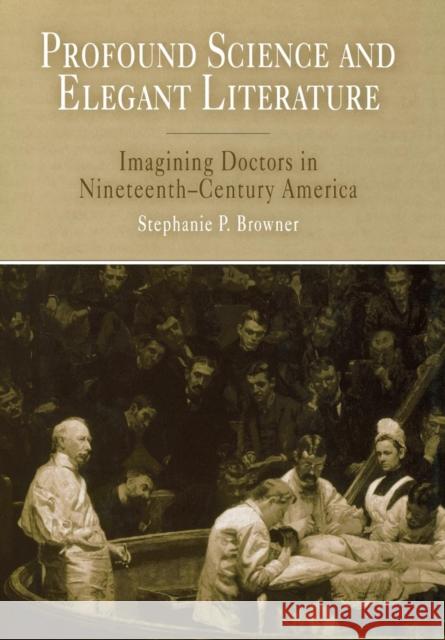Profound Science and Elegant Literature: Imagining Doctors in Nineteenth-Century America » książka
Profound Science and Elegant Literature: Imagining Doctors in Nineteenth-Century America
ISBN-13: 9780812238259 / Angielski / Twarda / 2004 / 304 str.
Profound Science and Elegant Literature Imagining Doctors in Nineteenth-Century America Stephanie P. Browner "This meticulous study of the descent and ascent of medical reputations considers fiction and visual art of the nineteenth and twentieth centuries, along with medical journals and letters circulated among members of the profession. . . . Comprehensive and utterly readable."--Choice In 1847, at the first meeting of the American Medical Association, the newly elected president reminded his brethren that the profession, "once venerated," no longer earned homage "spontaneously and universally." The medical marketplace was crowded and competitive; state laws regulating medical practice had been repealed; and professional practitioners were often branded by their lay competitors as aristocrats bent on establishing a health care monopoly. By 1900, the battles were over, and, as the president of AMA had hoped, doctors were now widely venerated as men of profound science, elegant literature, polite accomplishments, and virtue. In fact, by 1900 the doctor had replaced the minister as the most esteemed professional in the United States; disease loomed larger than damnation; and science promised to manage the discord, differences, and excesses that democracy seemed to license. In Profound Science and Elegant Literature, Stephanie Browner charts this trajectory--and demonstrates at the same time that medicine's claims to somatic expertise and managerial talent did not go uncontested. Even as elite physicians founded institutions that made professional medicine's authority visible and legitimate, many others worried about the violence that might attend medicine's drive to mastery and science's equation of rational disinterest with white, educated masculinity. Reading fiction by a wide range of authors beside and against medical texts, Browner looks to the ways in which writers such as Hawthorne, Melville, Holmes, James, Chesnutt, and Jewett inventoried the collateral damage that might be done as science installed its peculiar understanding of the body. A work of impressive interdisciplinary reach, Profound Science and Elegant Literature documents both the extraordinary rise of professional medicine in the United States and the aesthetic imperative to make the body meaningful that led many American writers to resist the medicalized body. Stephanie Browner is Dean of Faculty and Associate Professor of English at Berea College. She is coauthor of Literature and the Internet: A Guide for Students, Teachers, and Scholars (with Stephen Pulsford and Richard Sears). 2004 312 pages 6 x 9 5 illus. ISBN 978-0-8122-0148-2 Ebook $59.95s 39.00 World Rights Literature, American History Short copy: By the latter part of the nineteenth century, the physician had supplanted the clergyman as the nation's most esteemed professional, as the body had seemingly replaced the soul as a person's most prized possession. Stephanie Browner looks at this era of change.











